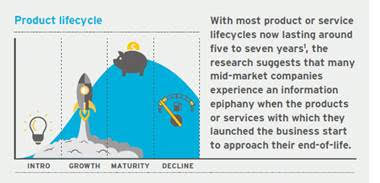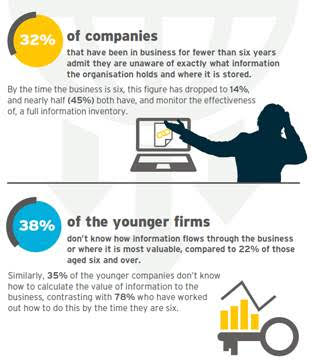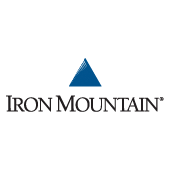New businesses in Europe and North America get serious about information sharing and management after first five years
Mid-market businesses aged six and over are twice as likely to have measures in place for making the most of information, compared to their younger counterparts, according to a new report by storage and information management firm, Iron Mountain (NYSE: IRM) and PwC. The survey results show that somewhere between their fifth and sixth birthdays, many mid-market companies start to introduce robust processes for prioritising and sharing valuable information more widely across the business, and ensuring that these other functions have the skills they need to derive value from it.
With most product or service lifecycles now lasting around five to seven years, the research suggests that many mid-market companies experience an information epiphany when the products or services with which they launched the business start to approach their end-of-life.
 Companies that have been in business for six years or more are twice as likely as the younger group to make valuable and sensitive company information available to research and development (31 per cent compared to 17 per cent); marketing (27 per cent compared to 13 per cent); finance (26 per cent compared to 19 per cent); and management (43 per cent compared to 27 per cent).
Companies that have been in business for six years or more are twice as likely as the younger group to make valuable and sensitive company information available to research and development (31 per cent compared to 17 per cent); marketing (27 per cent compared to 13 per cent); finance (26 per cent compared to 19 per cent); and management (43 per cent compared to 27 per cent).

This wider access to information is matched by a commitment to skills. The study shows that between five and six years of age, the ability to extract value from information jumps from 16 to 28 per cent in R&D, from 14 to 27 per cent in marketing and from 19 to 31 per cent in management.
This significant step-change in the way information is managed and used is also evidenced elsewhere in the study. One in three (32 per cent) of companies that have been in business for fewer than six years admit that they are unaware of exactly what information the organisation holds and where it is stored. By the time the business is six, this figure has dropped to 14 per cent, and nearly half (45 per cent) both have, and monitor the effectiveness of, a full information inventory.

Over a third (38 per cent) of the younger firms don’t know how information flows through the business or where it is most valuable, compared to 22 per cent of those aged six and over. Similarly, 35 per cent of the younger companies don’t know how to calculate the value of information to the business, contrasting with 78 per cent who have worked out how to do this by the time they are six.
“We looked at mid-market companies aged from six months to 20 years and we see that many 5-year-old companies move out of their information infancy and grow up fast. As they transition to their second generation of products and services, they start to take information management more seriously. They look to take better control of the information they hold and allow it to flow more freely around the organisation so that relevant functions can use it to support business goals. As a result they see benefits in terms of insight-led innovation, enhanced customer engagement and improved management decision-making,” said Elizabeth Bramwell, director, Iron Mountain.
The Iron Mountain and PwC study questioned 1,800 senior business leaders, divided equally between Europe and North America mid-sized companies (over 250 employees) and enterprises (over 2,500 employees). The results of the study have been used to create an Information Value Index that measures how well different businesses in different countries currently manage their information for competitive advantage. Organisations can use the findings to explore their own performance and define the practical action they can take to better exploit information.
[su_box title=”Iron Mountain and PWC” style=”noise” box_color=”#0e0d0d”]Iron Mountain and PwC surveyed 1,800 senior business leaders across a broad range of sectors (energy, financial services, legal services, manufacturing and engineering, healthcare (US only) insurance, pharmaceuticals), in North America (US and Canada) and five European countries (France, Germany, Spain, the Netherlands and the UK). The responses to 36 of the questionnaire statements in the survey drive and populate the information value index. PwC and Iron Mountain consider these statements to represent the core organisational (governance and culture) and technical capabilities (skills and tools) and the associated benefits that demonstrate an information advantage.[/su_box]
[su_box title=”About Iron Mountain” style=”noise” box_color=”#0e0d0d”] Iron Mountain Incorporated (NYSE: IRM) is a leading provider of storage and information management solutions. The company’s real estate network of 64 million square feet across more than 1,000 facilities in 36 countries allows it to serve customers around the world. And its solutions for records management, data backup and recovery, document management and secure shredding help organisations to lower storage costs, comply with regulations, recover from disaster, and better use their information for business advantage. Founded in 1951, Iron Mountain stores and protects billions of information assets, including business documents, backup tapes, electronic files and medical data.[/su_box]
Iron Mountain Incorporated (NYSE: IRM) is a leading provider of storage and information management solutions. The company’s real estate network of 64 million square feet across more than 1,000 facilities in 36 countries allows it to serve customers around the world. And its solutions for records management, data backup and recovery, document management and secure shredding help organisations to lower storage costs, comply with regulations, recover from disaster, and better use their information for business advantage. Founded in 1951, Iron Mountain stores and protects billions of information assets, including business documents, backup tapes, electronic files and medical data.[/su_box]
The opinions expressed in this post belongs to the individual contributors and do not necessarily reflect the views of Information Security Buzz.



